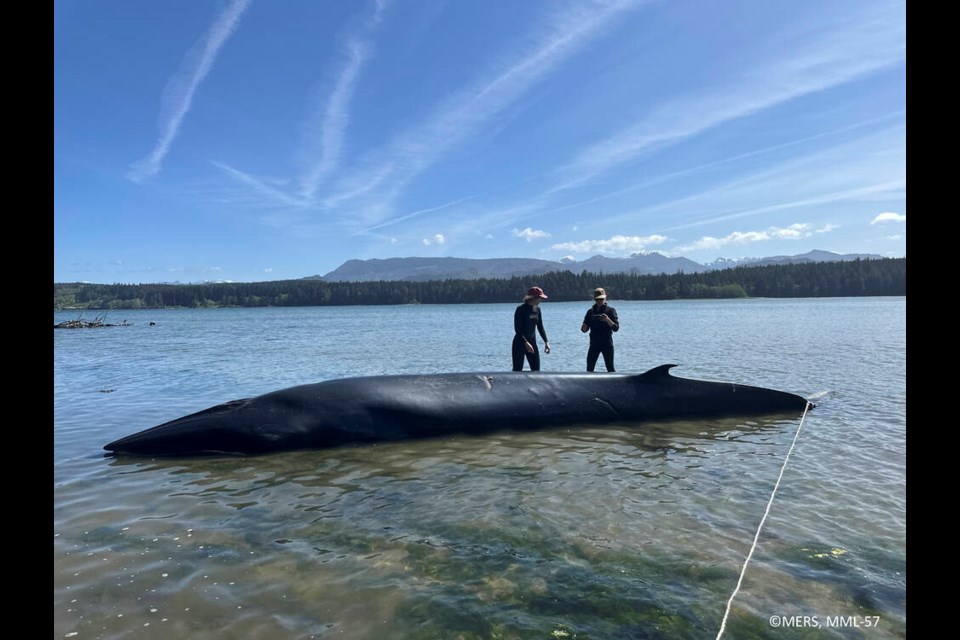The third dead whale to wash ashore on the B.C. coast this month was discovered Thursday at Port McNeill Bay.
The young Bryde’s whale is rarely seen this far north and is usually found in warmer tropical and subtropical waters, closer to Mexico.
Paul Cottrell, head of the Marine Mammal Unit for Fisheries and Oceans Canada, said Bryde’s whales have never been seen before in British Columbia waters.
A necropsy was completed Friday with the provincial wildlife veterinarian and the DFO to determine the cause of death.
The whale was initially believed to be a minke whale, but was later confirmed to be a sub-adult male Bryde’s whale by the Marine Education and Research Society and Bay Cetology, based in Alert Bay.
Bryde’s whales (pronounced BROO-dus) are a type of baleen whale, feeding primarily on plankton and small schooling fish. They span the globe but are rarely seen in waters north of latitude 35° north.
The whale washed up in ’Namgis First Nation territory. The First Nation said it is deeply concerned by the death of any whale, but the rarity of this species appearing so far north makes the event particularly significant.
’Na̱mg̱is GuardiaNs were dispatched to monitor the site, educate onlookers and ensure public and pet safety with respect for the animal. A blessing ceremony has been planned to honour the whale and provide a respectful foundation for the scientific work to follow.
“’Na̱mg̱is First Nation is very sad and concerned with the climate crisis and the health of our oceans,” said Chief Victor Isaac. “We will work with all parties to determine what has happened to this individual and hopefully come to better understand how to be the best stewards of our awi’nakola — our territory.”
The Marine Education and Research Society said the ’Na̱mg̱is First Nation has agreed to gift the remains of the young whale to the Whale Interpretive Centre in Telegraph Cove so that the knowledge of the species can be preserved for generations.
The museum and nearly all of its skeletal specimens were lost to a fire last summer, but the centre is being rebuilt with hopes to fully reopen in 2026.
The first reported dead whale to wash ashore on the B.C. coast this month was a grey whale found on Long Beach in Pacific Rim National Park Reserve near Tofino on May 7. On May 11, another grey whale was found dead near Skidegate on Haida Gwaii. Necropsies were done on the two whales to determine the cause of deaths, but the results will take up to two months to finalize.
Cottrell said the only other Bryde’s whale ever found so far north was discovered dead in the Puget Sound area of Washington State in 2010.
Bryde’s whales are considered one of the great whales, or rorquals, a group that also includes blue and humpback whales, according to NOAA, the U.S. federal ocean agency.
Bryde’s whales can grow to 55 feet long and weigh up to 90,000 pounds. The head of the whale makes up about one quarter of its entire body length. They have a broad fluke and a pointed and strongly hooked dorsal fin located about two-thirds back on the body.
NOAA says Bryde’s whale populations are exposed to a variety of stressors and threats, including vessel strikes, ocean noise and whaling outside the waters of Canada and the United States.
Bryde’s whales are the third most commonly reported species struck by vessels in the southern hemisphere, according to NOAA, as they spend most of the day close to the surface and feed by skimming the surface, lunging and creating bubble nets.
The whales are named for Johan Bryde, a Norwegian who built the first whaling stations in South Africa in the early 20th century.
DFO said its marine mammal response team works with partners to recover biological samples and conduct necropsies on dead whales to further understanding of the populations and the causes of death.
The department asks the public to call the Observe, Record, Report/ Marine Mammal Incident Hotline at 1-800-465-4336, email: [email protected] to report occurrences of whales being harassed or disturbed, and instances of collision with whales or whale entanglements.
Mariners who are unable to reach the incident reporting hotline can call the Canadian Coast Guard’s marine mammal desk at 1-833-339-1020 or report it to coast guard’s marine traffic radio.



